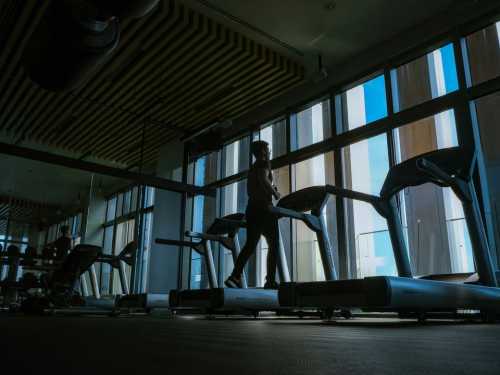Carl Froch reignited his British rivalry with George Groves in a rematch for the WBA and IBF world super-middleweight titles at Wembley Stadium on May 31, 2014; Groves had been controversially stopped by Froch in their first fight on November 23, 2013
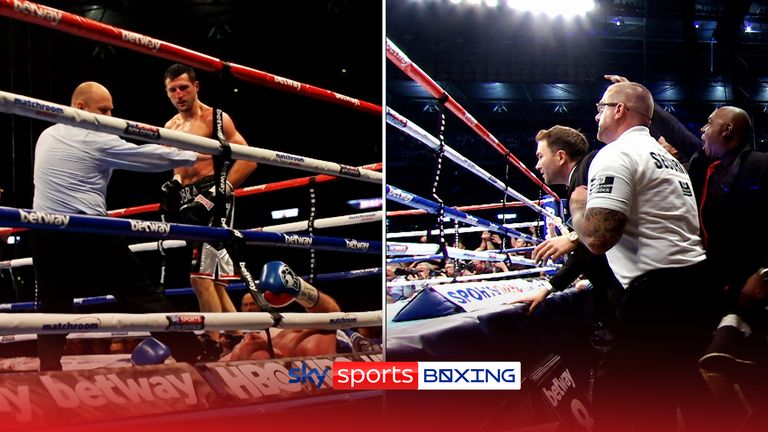
On the 10-year anniversary of Froch v Groves 2 we relive all the drama at Wembley from the experience of a fan in the front row
Froch vs Groves 2 was the most eagerly anticipated all-British showdown in a generation.
Controversy, outrage and indignation combined to make the public’s appetite to see the pair of them fight again insatiable, and so Wembley Stadium was booked and 80,000 tickets were sold.
A young Anthony Joshua was on the undercard, early in his professional journey following his London Olympics success. A golden era in British boxing was about to be ushered in and at its dawning was Froch vs Groves 2.
Froch closed the book on his long and storied career by supplying the perfect knockout. The man himself, with a little help from his cornerman Mark Seltzer, his promoter Eddie Hearn and referee Charlie Fitch, takes us behind the scenes and into the ring to give us the inside story, through the eyes of ‘The Cobra’.
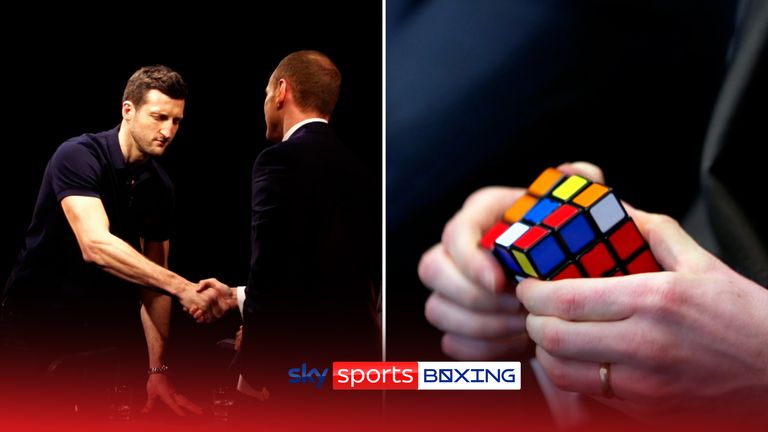
We look back at the entertaining journey to the Wembley rematch which had plenty of ‘push and pull’
Eddie Hearn – I went to see Carl at lunchtime because Carl is the most unconfident, insecure fighter you’ve ever met, which is bizarre, unbelievable. I walked into his flat in Highgate Village and I sat down and we were having a cup of coffee, three hours to go until he was going to the venue and he went, ‘what do you think about this fight then?’ And that’s what he would always say to me, ‘what do you think about this fight?’ And I said, ‘this is what I think. That first fight you overlooked him. You’re on another level, he cannot compete with you, do you understand?’ That’s how you had to talk to Carl. He was so nervous Carl. I was in my mid-30s, I knew nothing really and there I am having to reassure a Hall of Fame fighter.
Mark Seltzer – Darren from Matchroom came to pick us up. Carl actually had a sponsored truck with a cobra on it and all that. It wasn’t the most comfortable ride but he pledged to the sponsors that he’d use it for driving around to all the press stuff. So the photographers were there and there was a film crew so we drove off in the truck, probably for about 100 metres, then switched, got in with Darren and went off to the fight.
And now over to the man himself.
“I went through the back through the service entrance but I remember getting out of the car and taking a little walk round to have a look out onto the pitch and AJ was actually fighting, he was finishing some kid off, and I remember hearing the roars, and it wasn’t even that busy, and I remember thinking ‘colosseum vibes’. The noise dissipates into the air in a stadium, it doesn’t bounce off the ceiling like it does in an arena, and that’s when the nerves started to kick in a little bit. I could feel my heart pounding in my chest and I started to feel a little bit nervous.
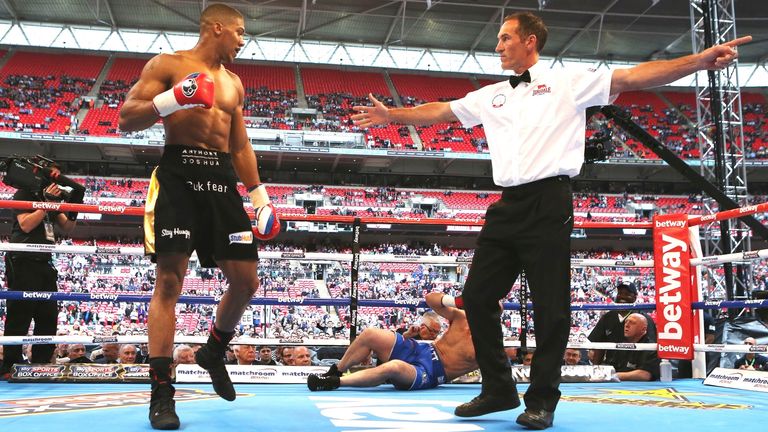
Image: Anthony Joshua stopped Matt Legg on the Wembley undercard for Froch vs Groves 2
“I got to the dressing room and the drug-test man was there straightaway. I was like ‘can’t we do this after?’ And he said ‘we can do but I’ll have to stay with you’, and I was like, ‘well I need a sleep, I’ve got here early’. So I got my kit and went into the changing rooms and I went to a physio room which was quite small because I wanted to lie down, not so much sleep, just gather my thoughts, because I knew it was my last fight you see, I knew during the camp ‘I don’t want to do this anymore’. I felt myself, during the camp, a split second behind in the sparring and thinking that I was seeing shots and not landing them and seeing shots coming and not getting out of the way of them so I knew I was kind of on my way down.
“I was sitting there in the physio room with the lights out, totally black, and the geezer was moaning about the lights, saying that we needed to keep the lights on because he needed to be able to see me. I told him he could put his phone light on if he wanted to but that I needed to get some sleep. I just wanted to sit down and meditate for half an hour, 45 minutes.
“I like to do it, I like to sit there and concentrate and gather my thoughts and I remember lying there and visualising the ring and visualising round one and taking the centre of the ring, and not looking at Groves the whole build-up, until the first bell goes. I don’t want to see his face, I was so wound up from the first one. I’d done so well ignoring him and I’d been speaking to Chris Marshall, the psychologist, to not get involved in anything beforehand because if I get wound up it affects me in a negative way. In the first fight with Groves I was that fuming and this time I needed to remain calm and focused and concentrate.
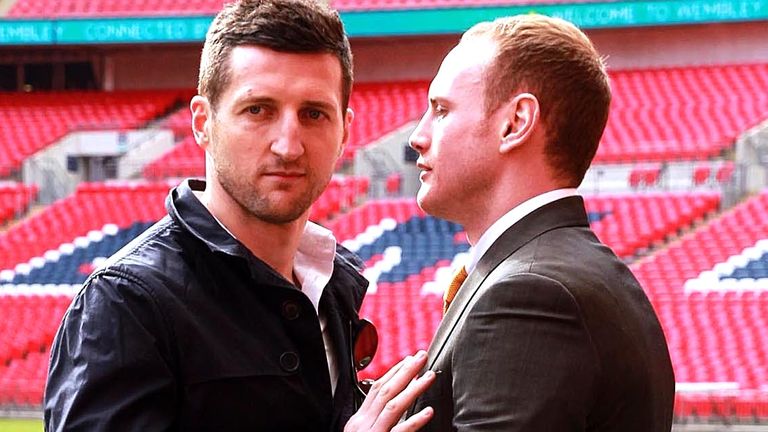
Image: Froch and Groves had traded heated words during a fiery build-up
“So that’s what I was doing, And when I was lying there, I wasn’t really falling asleep, your heart’s beating and when you’re picturing the ring walk it’s like you’re there, it’s meditative and they’re quite vivid, the images that you get and the emotions you get are actually kind of real.
“About an hour beforehand I woke up or came out of that meditative state. In the changing room beforehand Wayne Rooney came in and that made me realise the fight’s coming close now.”
Referee Charlie Fitch – A memory that stands out for me was doing the dressing room rules. Both fighters were at that level of focus that world championship level fighters have. You could see both were confident without being over-confident. So when I was doing the rules with Carl Froch, I felt from watching the first fight there was some fouling from both fighters, so I stressed to both fighters that I wanted a clean fight and Carl Froch, I think he was having his hands taped at that time and he wasn’t really looking at me, and when I said that to him, he just kind of looked up at me, and just stared right at me and didn’t say a word. And then I just continued on with the dressing room instructions and when I got out I remember thinking to myself ‘this could be a rough fight’. I interpreted that look as him saying ‘I’m going to do what I want and you’re just going to have to deal with it.’
“And then it’s like ‘six minutes you’re on’. And I’m a big Eminem fan so I always think of that song, ‘Six minutes Slim Shady and you’re on’. And then it’s like ‘bosh, switch on, it’s ring-walk time, cometh the hour, cometh the man, there’s no backing down, time to go’.”
Mark Seltzer – The ring walk. We discussed the music earlier in the week. I said he should do Queen’s We Will Rock You as Queen had a lot of history at Wembley, so it started with that and went into a mix of Welcome to the Jungle. I’m getting goosebumps now just thinking about it.
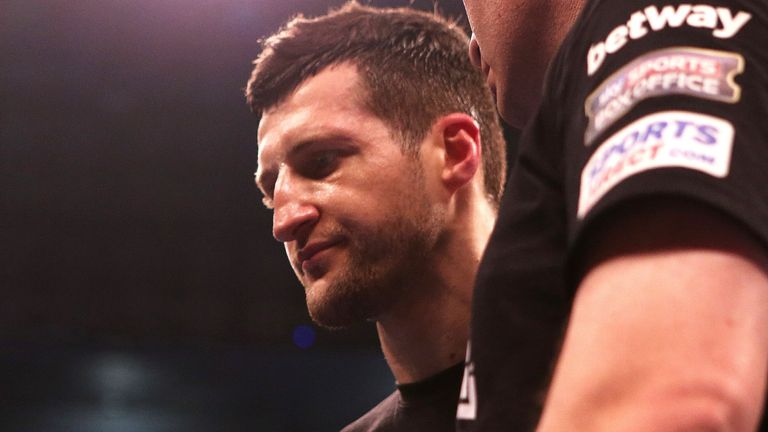
Image: Froch refused to look at Groves after entering the ring
“I faced my corner the whole announcement, never looked at Groves once, I Ignored him, faced the corner post. And then after we did the announcements, we were called to the centre of the ring and that was the first time I clapped eyes on Groves, in the centre of the ring with the referee giving his instructions. I touched gloves and smiled at him and showed him my gumshield. It was a like a new design gumshield and Groves wanted it and I got it and the guy said he wouldn’t let George have one now I’d got one. For me that was a little win. George said he didn’t even know but I think he did. And then it’s; bell goes, round one, centre of the ring, behind the jab.
“First seven rounds I felt like it was a slow, boring one but this is good because he’s moving so much. I’m in the centre of the ring and he’s circling and we’ve got the smallest possible ring and he didn’t find out until the day how small that ring was. [Froch’s trainer] Rob McCracken got the smallest ring possible. Groves got there and he was fuming about how small the ring was. Biggest stadium available, smallest ring.
“I knew he was going to box and run, he likes to keep out of the way and box and he had nowhere to go and our game plan was to sit in the middle of the ring, not take a step backwards and when he comes, meet him and put him on his back foot. And that’s what I did. To the spectator, to the layman, there was nothing really happening, but to me in there I remember thinking, ‘he’s not hitting me with anything and although I’m only hitting him with the odd jab, the odd little exchange, I’m backing him up, putting him in the corners, he’s getting out of the corners, circling, he’s moving loads, his feet will be killing him, his legs will be getting tired’. And every time I got near him I’d try and put a couple of body shots in, a couple of head shots. But I’m just thinking, round five, round six, round seven, this is beautiful, he’s starting to slow down.
“By round seven, I’m thinking ‘right, it’s the second half now’. The first half, it’s anyone’s, he could have been winning, I could have been winning, he’ll say he was winning six-nil but it didn’t matter to me because in my head I’d done the job I needed to do, backing him up, putting him in the corners, not taking a step back. I could feel him slow down in round seven. Every time we came together I could feel him slowing down. Before the knockout came I can remember throwing a check hook, right hand and I missed but I thought, ‘that’s the shot’.
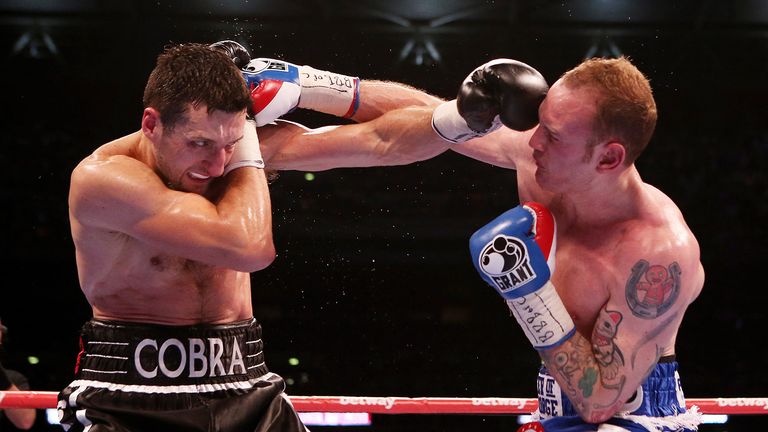
Froch ended the fight in spectacular style in the eighth round
“He was moving that way because he was looking for the left hook; he’d told everybody he was going to knock me out with a left hook. He was looking for that left hook so he was going to his left and dropping that glove, which was low anyway. So before the knockout; against the ropes, backed him up, got in close, hit him with a little jab, then two big body shots, really hard, my feet were set on the floor, sinking them in and feeling his ribs on my knuckles and I thought ‘they’re hurting him’ and then he backed up to the ropes towards the corner and I thought, ‘right, he’s gonna go to his right now’. And you’re not thinking about too much but you just kind of know, it’s automatic, it’s just happening.
“He put himself in a position where he’s against the ropes so I threw a little feint, got him to react, and then it’s check hook, right hand and that right hand could not have connected any cleaner and as soon as it hit him I remember feeling it go down my shoulder and thinking, ‘I caught him sweet, right on the chin’. Because when you land you’re not sure where you’ve hit him, on the top of the head, the shoulder…. I saw him drop and I thought ‘that’s a great shot, probably the best shot I’ve ever landed’.
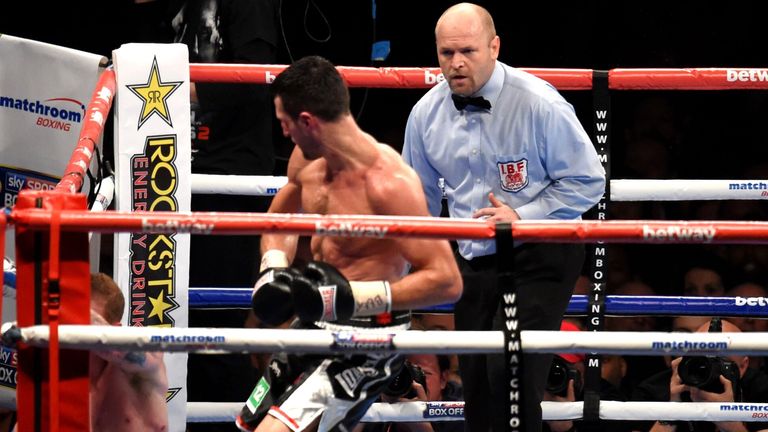
Image: Referee Charlie Fitch waved off the fight at Wembley Stadium
“Because I threw the check hook my body was coiled to my right side so everything then exploded like a golf swing or a tennis shot or a big right hand from The Cobra. And I remember when it landed thinking ‘if he gets up from that I’ll be in for the big finish here and it’ll look great’. I wasn’t thinking, ‘stay down’. I was just thinking, ‘keep cool’. I’d been there a few times and when I saw the ref wave it off I just thought, ‘game over’.
“I wasn’t thinking too much, I didn’t get too emotional, I was that much in the zone, it was just seek and destroy and when the knockout came I just kind of knew it was coming.”
A chapter from ‘The Knockout – Sport’s Most Decisive Moment’, written by Andy Clarke, published by Aurum, available from May 30.
Sourse: skysports.com


